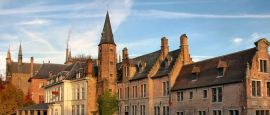Getting around Belgium
Belgium has a first-rate highway system linking all the main cities and towns. Queues are uncommon except around Brussels’ outer ring road during rush hour and the road to the coast during summer.
Main towns are connected by toll-free motorways.
Motorways are designated by a white 'E' on green signs, other trunk roads by the prefix 'N', and minor roads by a 'P'.
Both self-drive and chauffeur-driven cars are available. All the major car hire companies are present in Belgium.
Plentiful in all towns. The tip is included in the final meter price. If there are no taxi stands, you can phone taxi companies for a small extra charge.
Bike hire is quick and easy. Many outlets are located near train stations and Brussels has a 24-hour city bike-rental scheme, Villo!, with docking stations dotted all over the city centre.
The national speed limit is 120kph (75mph) on motorways, 90kph (56mph) on single lane roads and 50kph (31mph) in town. It is compulsory for seat belts to be worn in the front and back of vehicles. Children under 12 are not permitted to travel in the front seat of a car.
A warning triangle must be displayed at the scene of a breakdown or accident. It is compulsory to carry a fire extinguisher, a reflective vest and a first aid kit in all vehicles. Trams always have priority on roads.
Royal Automobile Club of Belgium (tel: +32 2 287 0911; www.racb.com).
For non-EU nationals, an international driving licence is recommended. Although it's not compulsory, EU nationals taking their own cars to Belgium are advised to take a Green Card.
There is a good public transport system in all the major towns and cities, with underground, tram and bus services in Antwerp and Brussels, bus and tramways in Charleroi, Ghent and Ostend and bus systems elsewhere.
The public bus system is run by De Lijn (www.delijn.be) in Flanders, TEC (www.infotec.be) in Wallonia and STIB (www.stib-mivb.be) in Brussels. There is a standard flat-fare system, with discounts for five- and 10-journey multi-ride tickets. One-day tickets and multi-mode tourist travelcards are also available.
The national Belgian rail network NMBS/SNCB (tel: +32 2 528 2828; www.belgianrail.be) operates a comprehensive railway network with regular trains on most lines. There are more frequent trains on the main lines.
Fares: First- and second-class, single and return tickets are available. However, a return ticket is double the single fare and is only valid on the day of issue. Children under 12 travel free in second class (restrictions apply).
Discount travel: Weekend return fares are available from Friday (after 1900) to Sunday for the outward journey and on Saturday and Sunday for the return journey, giving a 50% reduction. Go Pass 10 offers preferential tariffs for 10 second-class trips within one year to people under 26. The Rail Pass offers preferential tariffs for 10 second-class trips within one year to people over 26. People aged 65 and over benefit from special tariffs. All are available from NMBS/SNCB.
The InterRail One-Country Pass offers travel for three, four, six or eight days in one month within Belgium. Travel is not allowed in the passenger's country of residence. Travellers under 26 years receive a reduction. Children under 12 travel free when accompanied by an adult using an Adult Pass. Supplements are required for some high-speed services, seat reservations and couchettes. Discounts are offered on Eurostar (www.eurostar.com) and some ferry routes.
Do you have any Feedback about this page?
© 2026 Columbus Travel Media Ltd. All rights reserved. No part of this site may be reproduced without our written permission, click here for information on Columbus Content Solutions.




 You know where
You know where